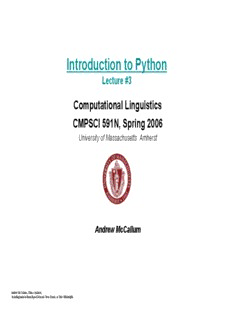
Introduction to Python - University of Massachusetts Amherst PDF
Preview Introduction to Python - University of Massachusetts Amherst
Introduction to Python Lecture #3 Computational Linguistics CMPSCI 591N, Spring 2006 University of Massachusetts Amherst Andrew McCallum Andrew McCallum, UMass Amherst, including material from Eqan Klein and Steve Renals, at Univ Edinburghh Today’s Main Points • Check in on HW#1. • Intro to Python computer programming language. • Some examples Linguistic applications. • The NLTK toolkit. • Pointers to more Python resources. Andrew McCallum, UMass Amherst, including material from Eqan Klein and Steve Renals, at Univ Edinburghh Python Outline • Introduction – Python attributes and ‘Why Python?’ – Running programs – Modules • Basic object types – Numbers and variables – Strings – Lists, Tuples – Dictionaries • Control Flow – Conditionals – Loops Andrew McCallum, UMass Amherst, including material from Eqan Klein and Steve Renals, at Univ Edinburghh Python Features • Free. Runs on many different machines. • Easy to read. – Perl = “write only language” • Quick to throw something together. – NaiveBayes Java vs Python • Powerful. Object-oriented. • THE modern choice for CompLing. • NLTK Andrew McCallum, UMass Amherst, including material from Eqan Klein and Steve Renals, at Univ Edinburghh Using Python Interactively The easiest way to give Python a whirl is interactively. (Human typing in red. Machine responses in black.) $ python >>> print “Hello everyone!” Hello everyone! >>> print 2+2 4 >>> myname = “Andrew” >>> myname ‘Andrew’ Andrew McCallum, UMass Amherst, including material from Eqan Klein and Steve Renals, at Univ Edinburghh Modules To save code you need to write it in files. Module: a text file containing Python code. Example: write the following to file foo.py print 25*3 # multiply by 3 print ‘CompLing ‘ + ‘lecture 3’ # concatenate with + myname = ‘Andrew’ (No leading spaces!) Then run it as follows: $ python foo.py 75 CompLing lecture 3 $ Andrew McCallum, UMass Amherst, including material from Eqan Klein and Steve Renals, at Univ Edinburghh Importing Modules Every file ending in .py is a Python module. Modules can contain attributes such as functions. We can import this module into Python. $ python >>> import foo 75 CompLing lecture 3 >>> foo.myname ‘Andrew’ Andrew McCallum, UMass Amherst, including material from Eqan Klein and Steve Renals, at Univ Edinburghh Module Reloading Importing is expensive--after the first import of a module, repeated imports have no effect (even if you have edited it). Use reload to force Python to rerun the file again. >>> import foo 75 CompLing lecture 3 Edit foo.py to print 25*4 (instead of 25*3) and reload >>> reload(foo) 75 CompLing lecture 3 <module ‘foo’ from ‘foo.py’> Andrew McCallum, UMass Amherst, including material from Eqan Klein and Steve Renals, at Univ Edinburghh Module Attributes Consider file bar.py university = ‘UMass’ department = ‘Linguistics’ >>> import bar >>> print bar.department Linguistics >>> from bar import department >>> print department Linguistics >>> from bar import * >>> print university UMass from copies named attributes from a module, so they are variables in the recipient. Andrew McCallum, UMass Amherst, including material from Eqan Klein and Steve Renals, at Univ Edinburghh Python Program Structure • Programs are composed of modules • Modules contain statements • Statements contain expressions • Expressions create and process objects • Statements include – variable assignment, function calls – control flow, module access – building functions, building objects – printing Andrew McCallum, UMass Amherst, including material from Eqan Klein and Steve Renals, at Univ Edinburghh
Description: